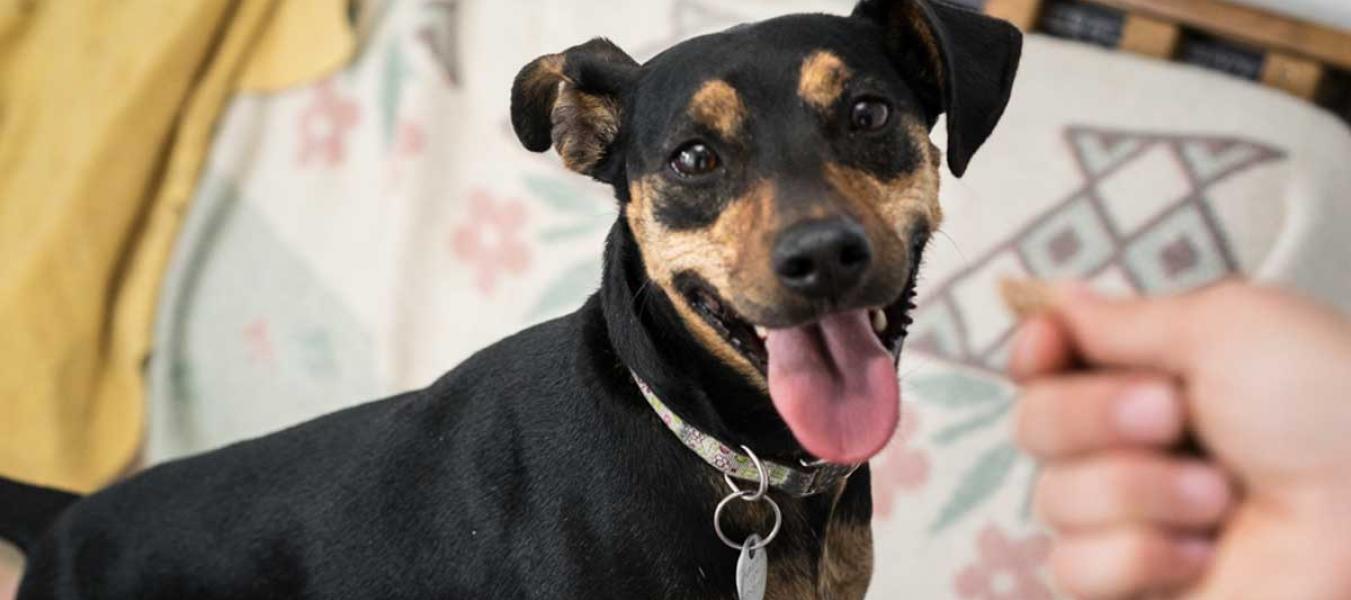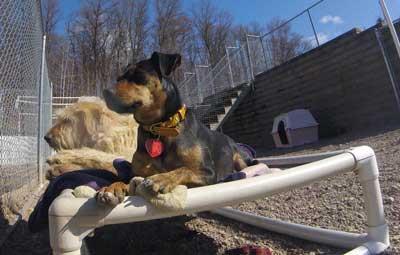
Tippi is a Manchester Terrier with uncropped ears, a spayed female, now 4 years old, who came to Home for Life from the SICSA.org shelter of Dayton, Ohio, and she is best friends with Rocket, who is just about her size.

Tippi, who was known as Minnie when she lived in Ohio, loves other animals, and can hold her own even with larger dogs. In addition to Rocket, her roommates include two of gentle dogs from Vafa Shelter in Iran, Parichaehr and Alborz, Dulcie a very timid labradoodle a confiscation from a hoarding case investigation when a rescue was shut down, and Houston, a stately, senior puggle from the Animal Ark Shelter of Hastings. In this group, Pari, Alborz and Dulcie form a tight knit group of close friends, then Rocket and Tippi are a pair while curmudgeon Houston is more a singleton but is still on good terms with everyone and is definitely part of the pack! Tippi has found her true family among this close knit group of dog friends.
Tippi has had a hard time learning to trust people,through no fault of her own, and for this reason the safety net of a sanctuary proved to be the most humane option for her. She had been through so much in her few years, and if not for the compassionate shelter employees of SICSA.org, Tippi would have been another " unadoptable" animal, lost to the animal rescue system as it now operates.
In September 2014, Tippi was rescued by SICSA from a county shelter in Ohio which had a very high kill rate. During her intake exam at the shelter the staff at SICSA found that she wasn't putting a lot of pressure on her back, left leg and investigated further. It turns out that Tippi had a leg fracture that never healed and, this old injury was causing poor Tippi a great deal of pain. Her leg was reset by a veterinary surgeon, but this first surgery didn't go well – the plate on the leg of the healing fracture shifted until it actually came out of the wound. Tippi had to have a second, emergency surgery to reinsert the plate. She was placed in a foster to adopt situation at this point, and at last seemed to be on her way to recovery.

Unfortunately, when Tippi came back into SICSA a few weeks later for a recheck, their medical staff found that the foster had completely ignored all of the directions they had given to her. The foster had cut Tippi's cast and e-collar, kept her in a kennel 24/7, left for a weekend and didn't have anyone care for Tippi, and was just downright neglectful. As a result of her appalling treatment of Tippi, SICSA terminated this negligent foster's participation in the program, and took poor Tippi back into their custody.
Tippi was now safe again after this harrowing experience with "foster failure" but was in more pain than ever; her injured leg was now very infected, and she had gone thru two surgeries to reset the unhealed fracture and the recovery for nothing. At this point, the SICSA veterinarians made the difficult decision to amputate her leg that they felt was now beyond saving.
Once the leg was amputated, the source of Tippi's physical pain was removed, but many psychic and emotional wounds seemed to remain. She didn't show well in the shelter kennels, and would bark vigorously at prospective adopters and even lunge at the front of the kennel. She had no time for children which ruled out many families who were specifically looking for a smaller dog. Tippi was afraid of men. She liked some women but not all. Although she loved to sit on a lap, she had to initiate the contact - she was afraid of being picked up and put down, and would react aggressively with anyone who attempted to lift her - up or down. Who knows? Maybe being dropped was how her leg had been originally injured. Yet the staff was touched by her fighting spirit and the fact that Tippi still longed for affection. Tippi was conflicted, seeking attention but afraid of it too.

The shelter realized that Tippi needed another platform to showcase her attributes to visitors to the shelter. They knew she was a smart and loving dog but the shelter setting didn't allow her to demonstrate her potential. Various strategies were tried including keeping her at the customer service desk, in adoption rooms, having her attend outside events and featuring her on line. Another foster was tried, this time an experienced person who was actually a member of the shelters' staff, but Tippi's behavior only escalated in this setting as she seemed unable to overcome the hurdles her traumatic past has left her with. Her adoption candidacy depended on how she was received by the public looking for a new pet, and as SICSA said, no one wanted to consider a barking dog who was lunging at them in a kennel or on leash in a menacing way, or who would bite if picked up or put down. A dog behaviourist was consulted whose opinion was that Tippi was simply too unpredictable to adopt out safely.

At the time Home for LIfe and SICSA connected on Tippi's case, she had been at their shelter for several months, and her adoption candidacy was being called into question – shelter advocates sympathetic to Tippi's case were given two weeks to find another alternative for her. Shelters and rescues are organized to move animals through to new homes. But for a dog like Tippi, who can't easily find placement, these conventional resources, whose work is predicated upon being able to adopt out their animals, will never be a lifesaving option. Although she couldn't find an adoptive home, SICSA knew Tippi was an amazing dog whose opportunities had been drastically limited through circumstances beyond her control – a first home where she had been injured, left untreated, then abandoned at a high kill county shelter, two surgeries, a terribly negligent foster home that left her locked in a crate without care and attention and neglected her healing leg, a massive and painful infection that resulted, and finally the amputation of her injured leg. These experiences had left the high strung and sensitive Tippi traumatized and self protective, to the point that she couldn't "sell" herself as an adoption prospect.
After the months of work they had dedicated to restoring her health and trying to find a new home for her, SICSA hoped that with a stable environment of a sanctuary like Home for Life, Tippi would find the security and safety that had thus far eluded her. In the spring of 2015, Tippi made the flight from Dayton, Ohio to Home for Life, where volunteers met her flight at the Minneapolis/.St Paul airport, and transported her to Home for Life, just 45 minutes away.

Since one consistent theme of Tippi's months at SICSA was that she was comfortable with other dogs, we wasted no time in having her get to know some of our smaller, gentle dogs like Rocket. We had been warned that she would be cranky after her flight and with everything new, and would want to stay in her crate, and not welcome anyone around it. The crate was her security during her first few days at Home for LIfe and she would retreat to it if all the new sights and sounds became overwhelming. Soon her natural curiosity and energy overcame her wariness. We confirmed what SICSA warned us about her - Tippi was not a fan of being picked up. But if one of the staff sat down, we had to be prepared for cuddles! With dogs and people, Tippi lets it be known right away if they’re able to be in the cool crowd and be her friend. She has become a steadfast companion and protector of Rocket who like Tippi, had such a close call after being left at a high kill shelter. With her gallant spirit and high energy, she is able even to hold her with the curmudgeonly puggle Houston and three larger dogs in her group, and keep up with them during exercise times, even with only three legs.
After all the pain, both physical and emotional that marked Tippi's first years, it turned out that underneath all that bravado and Tippi's bruised soul was a very loving little dog, who has courageously been able to let go of the fear from the past and to embrace her new life at the sanctuary with her huge heart.
